Today it’s more important than ever to remember that the Bill of Rights is in constant danger.
Today it’s more important than ever to remember that the Bill of Rights is in constant danger.
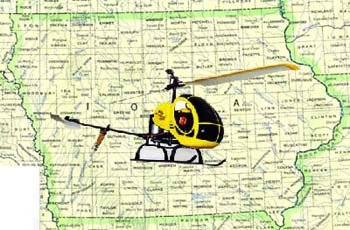
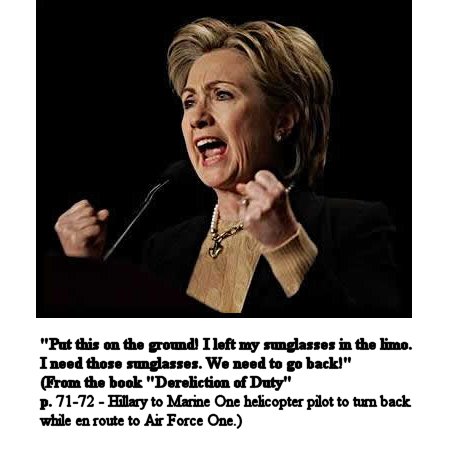
Hillary Clinton Set To Whir Across Iowa
Chicago Tribune.com
by Jason George
IOWA CITY, IA – It’s a bird. It’s a plane. It’s a Hill-A-Copter!
Or so the Clinton camp has branded a helicopter that the candidate will fly around in during her “Every County Counts Tour” across Iowa, beginning Sunday.
Campaign staffers are calling the tour a five-day blitz across Iowa’s 99 counties, but Clinton herself will only appear in 12. Husband/President Bill and “others” will hit the remaining 87 checkerboard jurisdictions that make up the Hawkeye State.
“In the final days before the Iowa caucuses, I want to tap into that spirit so that every voice is heard on caucus night for universal health care, a stronger economy and an end to the war in Iraq,” Candidate Clinton said last night in Iowa, according to a press release.

There was no word on the former president’s mode of transportation, but given the recent ice storm in the eastern half of the state, a His-and-Hers helicopter combo might not be a bad idea.
He might also consider a dog sled, which Estes Kefauver used to cross snowy New Hampshire during the 1952 and 1956 presidential primary. (Kefauver, a Tennessee senator, often outfitted himself in a coonskin cap too. President Clinton rarely wore headgear on the trail, except a baseball cap when jogging.)
The dogsled stunt worked for Kefauver, at least in New Hampshire, where he won both times, before losing the nomination – again, both times – to Adlai Stevenson.
Wild Thing’s comment……..
Flight of the Valkyries playing as she flys in her chopper anyone?? hahaha
Or maybe one like this a solar powered chopper just for Hillary.

.
 ….. Thank you Les for sending this article to me.And the graphic of the Hillary witch. LOL Too funny!!!
….. Thank you Les for sending this article to me.And the graphic of the Hillary witch. LOL Too funny!!!
Please watch this commercial Budweiser did after 9/11. They only aired it once so as not to benefit financially from it – they just wanted to acknowledge the tragic event.
 ….Thank you so much Darth for sending this to me. I had never seen it before.
….Thank you so much Darth for sending this to me. I had never seen it before.

Wild Thing’s comment……..
LOL
Maybe this is how people don’t seem to want to remember all those Gates and the many crimes of the Clinton’s. I mean it has to be something, because the nerve it takes for Hillary to run for office after all the years of “gates ‘ and deaths …hello Vince Foster, Ron Brown, Colby and soooooooo many others………. how else could a person forget.
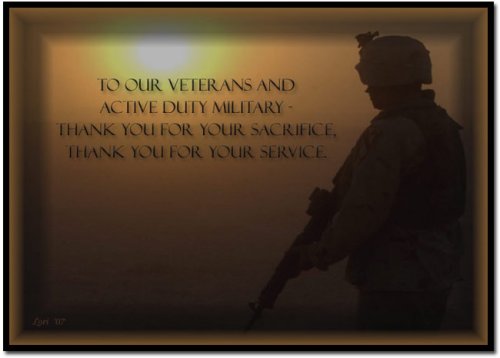
Injured Marines fighting on
By Ralph Peters
FORT SAM HOUSTON, SAN ANTONIO
The best way to capture the spirit of the severely wounded Marines who pass through the Center for the In trepid is just to tell their stories and let them speak for themselves:
Sgt. Eric Morante, a squad leader in Fox Company, 2nd Battalion, 7th Marines stood watch in a sandbagged observation post atop a bridge west of Fallujah. Visibility was great – five miles in each direction – preventing terrorists from planting roadside bombs.
But the bridge served a crucial highway, and traffic had to flow. Risk was unavoidable. The best the Marines could do was to keep vehicles moving. On April 20, a suicide bomber detonated 3,000 pounds of explosives underneath the Marine OP. The bridge collapsed.
Sgt. Morante landed hard, blacking out as debris covered him. When he came to a few minutes later, he was pinned under concrete shards. Struggling, he shoved the wreckage off him – then saw that his right leg had snapped back behind his body.
The leg was amputated by surgeons in Balad. Morante woke up in a military hospital in Germany. Next stop: San Antonio and rehab.
His chief ambition is still to become a drill sergeant. Missing a leg, he arranged for the Marine Corps logo to be painted on his prosthesis. “I was back on my feet in three months,” he says proudly – but he still faces all-day therapy.
It’s been a tough year: His father died, and his mother’s been sick. And some jerk stole the sergeant’s truck, which had been parked back home in Houston.
So what does he worry about? The other Marines wounded in the blast – and, especially, his Navy corpsman. The medic’s still in a coma down in Tampa Bay and may never come out of it. He’s never seen the child his wife delivered a few months ago.
* Then there’s Gunnery Sgt. Blaine Scott, 35, and a “lifer.” The gunny served with the 3rd Light Armored Recon Co. of the 1st Marine Division in Anbar Province. He was 6½ months into his second Iraq tour when an IED detonated under his vehicle.
Gunny Scott was burned over 40 percent of his body. He’s been in rehab for 16 months, with “too many operations to count.” Despite reconstructive surgery, his face still tells of wounds. But this Marine’s Marine is 1,000 miles away from self-pity: “Hey, this is what I do for a living, this is what I chose.”
It helps that Marines stay close and support each other. And that this Iowa native has a strong marriage and three great kids.
Gunny Scott praises the “awesome” quality of care he’s received. And he’s grateful for the Fisher House room in which his family spent three months before being assigned on-post housing.
When you first meet Gunny Scott, your eyes go to the burn scars on his face. That’s the plain truth of it. But he projects so much fortitude and pride that a strange thing happens: After a little while, it strikes you that he’s still a handsome man – a man you’re privileged to know.
His priority now? Working with new Marine patients to bolster their spirits.
* Lt. Col. Grant Olbrich, a Marine aviator, heads the local Patient Affairs Team from the Marines’ Wounded Warrior Regiment. He calls the Center for the Intrepid “wonderful” and the Army hospital “very supportive of Marines.”
But he also notes that Marines do miss their own culture. Part of that culture is the Corps Commandant’s position on severely wounded Marines: “If you want to stay in the Corps, we’re going to find a way to keep you.”
And Marines want to stay in. “They do not feel sorry for themselves,” Lt. Col. Olbrich says.
* Lance Cpl. Chris Traxson is on a high: He just got engaged to his high-school sweetheart.
He’d been on a Humvee patrol in the black heart of Fallujah – before the city “flipped” and turned on al Qaeda – when a bomb struck the underside of his Humvee. It wasn’t even his regular Humvee – that had been hit by another IED two days earlier.
Fire shot through the vehicle. He suffered third-degree burns over 56 percent of his body, along with bone exposure. He looks fine now – but, under his garments, he has to keep his skin moisturized at all times.
He’s come a long way, though. His parents had been at his bedside for two weeks before he “really” woke up in the burn center. Now he’s determined to move on: “For a long time, I was pretty depressed . . . for four or five months . . . but over time I came to grips with it: This is my new body.”
He was a police officer back home in Arkansas (the chief and his fellow officers came down to visit). That’s over now – but Traxson, who holds a degree in criminal justice, intends to go to law school. And he’s really looking forward to going home for Christmas.
His buddies avenged him, by the way: “They caught the guy who planted the IED, and he rolled over. He gave up the bombmaker.”
* When Sgt. Jose Martinez arrived for our interview at the ad hoc Warrior and Family Support Center, the room was so crowded and noisy that we had to move out to the hallway for the interview. He had to step carefully, skirting dangling decorations and the Christmas tree.
Sgt. Martinez is fighting blindness.
The movie-star handsome sergeant describes himself as a “Navy brat.” A brother’s in the Army – in Iraq.
Martinez is a Force Recon Marine, the elite of the elite. He’d been working with a sniper team in the city of Hit. The team pulled out of an infiltration mission to “act on intel” about insurgents planting a bomb – and a running gun battle developed. The Marines kept up the pressure, dueling with the insurgents. Wrapping things up, the team called for extraction by a Bradley combat vehicle.
But the insurgents had lured the Marines into a prepared site. As the team approached its ride back to safety, a buried bomb went off. Three Marines and a translator were killed. The three remaining Marines were gravely wounded.
Sgt. Martinez took shrapnel in his eyes. The retinal damage to his left eye limits him to three inches of vision. The right eye’s stronger, but his peripheral vision is gone and the discrepancy between his eyes prevents him from wearing corrective lenses as he walks. He’s at a point where further operations would only risk the vision that remains.
The sergeant calls himself lucky: Others died. He’s alive, with a girlfriend he adores and college ahead. “Whatever I decide to do, I’ll get it done,” the Marine said.
We joke about how close he has to be to recognize a pretty girl (the answer is very close). Then Sgt. Martinez grows wistful and adds a holiday message to us all, “Be grateful for what you have. Nothing is ever that bad.”
What you can do
You can donate to the Warrior and Family Support Center project via credit card by phone at 1-888-343-HERO or on the Web at ReturningHeroesHome.org.
To give by mail, send donations to: Returning Heroes Home, P.O. Box 202194, Dallas, TX 75320-2194. Checks should be made out to Returning Heroes Home, Inc. This is a nonprofit 501c3 endeavor; all donations are tax-deductible.
All contributions, in any amount, will help our wounded warriors. Please give to those who gave so much.
.

Wild Thing’s comment……..
This post has been copied completely from Pat Dollards blog. Pat is an awesome person and also is a huge supporter of our troops. You all know about him too so I will just say a big Thank you to Pat for this information.
Regarding our wounded, to the left they are numbers, to you and I they are Heroes. Our troops are not expendable, not to you and I and each one receives our respect and grateful hearts so filled that even words are hard to come by sometimes.
.
 …. Thank you Bob for telling me about this.
…. Thank you Bob for telling me about this.
.

* Pat Dollard’s blog
* Also posted at The Anti-Idoltarian Rottweiler
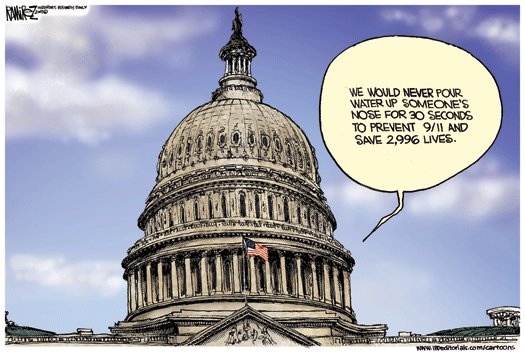
House votes to outlaw CIA waterboarding
WASHINGTON
(Reuters)
Defying a White House veto threat, the U.S. House of Representatives voted on Thursday to outlaw harsh interrogation methods, such as simulated drowning, that the CIA has used against suspected terrorists.
The Democratic-led House of Representatives voted on Thursday to outlaw harsh interrogation methods, such as simulated drowning, that the CIA has used against suspected terrorists.
On a 222-199 vote, the House approved a measure to require intelligence agents to comply with the Army Field Manual, which meets the Geneva Conventions on the treatment of war prisoners and prohibits torture.
Many countries, U.S. lawmakers and human rights groups have accused the United States of torturing terror suspects since the September 11 attacks.
President George W. Bush says the United States does not torture, but the administration will not disclose what interrogation methods it has approved for the CIA.
In threatening to veto the House-passed measure, which now awaits Senate action, the White House argued it would prevent the United States from conducting “lawful interrogations of senior al Qaeda terrorists.”
House Democratic Leader Steny Hoyer countered that the current administration had blurred the line “between legitimate, sanctioned interrogation tactics and torture.”
“There is no doubt our international reputation has suffered and been stained as a result,” Hoyer told colleagues.
Backers of harsh interrogation say it is needed to pry vital information out of enemy combatants. But critics say torture is inhumane and such information is often unreliable.
The CIA has told lawmakers they stopped waterboarding a few years ago, aides say.
The overall intelligence authorization bill that contains the interrogation provision faces another fight in the closely-divided, Democratic-led Senate.
The Army Field Manual provides 19 approved interrogation methods. They include isolating prisoners, allowing American interrogators to pose as representing another country and the “good-cop, bad-cop” interviewing technique.
It prohibits eight methods, including waterboarding.

Wild Thing’s comment……..
1) it worked and it saved lives
2) it’s been used rarely
3) Al qeada could give a crap about humane treatment
4) using it will not encourage other countries to torture our soldiers, because they already have and would have anyway.
5) And the Geneva Convention does not cover terrorists, it covers prisoners of war who are wearing the uniform of their country when captured
Any moral argument against it is countered by a moral argument against sitting there and not doing all one could to to prevent the deaths of large numbers of Americans. The bottom line is – would you rather have blood on your hands because you failed to take action known to elicit the info. to save lives.
I can think of 50 ways right off the bat that would be torture. And I wouldn’t be opposed to outright torture of these Isamonuts.
I am tired of tour country pandering to terrorists. Our American government officials continue to work against the safety of the public. They continue to support the activities of sworn murderers and our enemies who are devoted to killing us. They continue to kiss our enemies asses. They continue to work to destroy the republic.
Our islamic jihadist enemies certainly don’t limit themselves from employing any and every kind of torture imaginable. They’re laughing their butts off right now over this one.
When are these politicians going to condemn the treatment our soldiers and citizens receive from Al Queda.
IMO the Dems and rino’s already have blood on their hands. How many soldiers have died because the enemy was emboldened by the actions of the Dems and their kiss ups.
The House should stay out of the business of our Warriors!
Troops Christmas Parade in Iraq and Afghanistan – from last Christmas.
Troops from a few different countries.
This one was done in Iraq
This was done in Afghanistan…D Co 140th Aviation

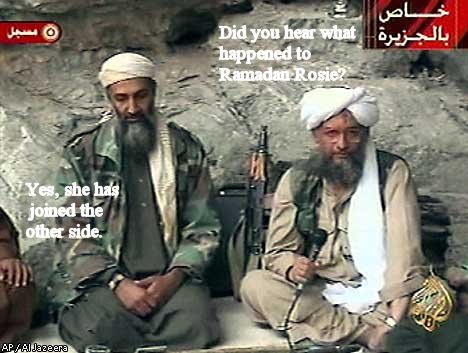
.
This is your ever loving Tigress of the Tigris, Ramadan Rosie.
As you can see I have joined the ranks of the winners. Ramadan Rosie is no fool, I may not have had the purple finger from voting without smelling Sadam lurking over my shoulder with a sword. I was busy that day telling the world how awful America was and I mocked the vote, and all that fought to make it happen. Yes your camo covered troops were my enemy. They meant freedom and I was sure I would not like it. But alas…………………….
Yes alas, after much thought and inspection of your country and your passion for your Freedom. I looked deeper into our Koran and what Allah has said. I was lied to, by Allah himself I tell you!! And the teachings I received of Muhammad were also lies. All lies much like the lies your Clinton’s tell and have gotten away with.
No longer will I kneel and pray 5 times a day, I have discovered much more enjoyment in going to the Allah’s Cut and Run for fashionable hair styles. And then sit in my newest non Burka outfit at the local Camel Riders Coffee Cafe and sip rich dark coffee as I visit with your troops and play dominoes.
No longer will those words ‘praise Allah’ cross my lips covered with this glossy Red # 5 by Chanel at your local Bazaar at the Mecca Mall.
Join me if you like in Operation Icebreaker as I join forces with your troops to bring you the truth about the liar Allah and his Koran filled with instructions of how to become Islamozombies of death.
shukran ( it means thank you and is Arabic and most applicable to the Gulf states such as Kuwait, Bahrain and Qatar)
Brought to you by Wild Thing and Darth.
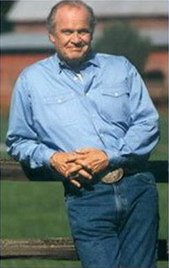
Fred Thompson supports Florida Marriage Amendment
USA Daily
GOP presidential hopeful Fred Thompson courted Social Conservatives in Florida by supporting the Florida Marriage amendment. Thompson issues the following statement:
“I applaud the work of Florida Coalition to Protect Marriage. Their efforts will give the people of Florida a voice on this very important subject. I strongly believe in the time honored principle of marriage being a union between one man and one woman, the foundation of any civilized society. Florida’s Marriage Amendment will have my support in 2008. As President, I will appoint judges who apply the law, not make it up from the bench. We should not be held subject to judicially created social policy, and I will use the bully pulpit of the Presidency to defend the institution of marriage.”
TALLAHASSEE, Florida – Supporters of a Florida petition drive to ban same-sex marriage announced this morning that they have enough signatures to make the November ballot.
Supporters for the amendment who seek to protect the institution of marriage as a relationship between one man and one woman have gathered over 600,000 signatures to place the issue on the ballot on November 4, 2008.
The Florida amendment would protect the natural definition of marriage, thus preventing state judges from legalizing “gay marriage.”
In the past three years, five states without marriage amendments — Massachusetts, New York, California, Washington state and Maryland — have watched judges strike down those states’ respective marriage laws. Although Massachusetts is still the only state to recognize “gay marriage,” that could change by the end of the year.

Wild Thing’s comment……..
How sad to think in the world today there has to be an Amendment to say Marriage can only be between a man and a woman. IT SHOULD NOT BE NECESSARY …………BUT it is, because the world is upside down and PC runs crazy with an agenda to destory marriage and what it means.
You bet if it is on the ballot I will vote for marriage to be only between a man and a woman.
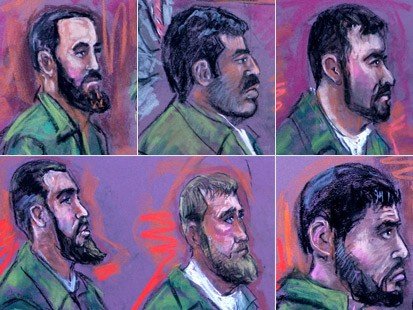
U.S.: Fort Dix Attack Plot Suspects Promoting Terror in Jail
HADDONFIELD, New Jersey
Fox News
Federal authorities say one of the men accused of planning an attack on soldiers at the Fort Dix army base gave another inmate in a federal detention center an Al Qaeda recruitment video and another wrote a note referring to the fight “we weren’t able to finish.”
The U.S. Attorney’s Office made the allegations in a brief filed in U.S. District Court late Tuesday to oppose the suspects’ request to be granted bail.
A lawyer for one of the men said the government is misrepresenting an incident in the Federal Detention Center in Philadelphia.
The suspects contend that the detention center staff has not allowed them adequate access to evidence in the case against them as they prepare for trial. That is why they have asked a judge to either allow them to be free on bail or come up with alternate arrangements to allow them to review materials for the trial, which is scheduled to begin March 24.
The five men — all foreign-born Muslims in their 20s — were arrested in May and charged with conspiring to kill uniformed military personnel. Authorities said they planned to sneak onto Fort Dix, a base in New Jersey used primarily to train reservists for duty in Iraq and Afghanistan.
A sixth man later pleaded guilty to providing weapons to some of the five charged in the alleged conspiracy.
In the legal filing, the government said Mohamad Ibrahim Shnewer gave another inmate a copy of an Al Qaeda-produced DVD last month. Guards found the disc in a book in the detention center’s law library.
Government lawyers said in the filing that “the fact the defendant Shnewer and, perhaps, his co-conspirators may be spreading jihadist recruitment videos to other inmates clearly raises grave security concerns for the warden, and, again, supports the reasonableness of continued administrative detention for these defendants.”
The government also said that suspect Eljvir Duka and another inmate were passing notes.
In one note, the government said, Duka wrote, “Now you see why we were going to sacrifice all for the sake of Allah in jihad” and referred to the fight “we weren’t able to finish.”
The government said detention center staff confronted Duka about the notes. According to the filing, he acknowledged he was passing them but said they only dealt with “issues such as the quality of the food” behind bars.
Duka’s lawyer, Troy Archie, did not immediately return a voice mail or e-mail message Tuesday night.
The government also said the five men have had access to the evidence when they requested it.
The five suspects include three ethnic Albanians from the former Yugoslavia, a Jordanian and a Turk.
A hearing on the men’s bail motion is scheduled for Dec. 20.

Wild Thing’s comment……..
Doesn’t anyone check this stuff before it goes into the prison library? So how long will it take till we hear the calls for their release. sheesh
Recent Comments